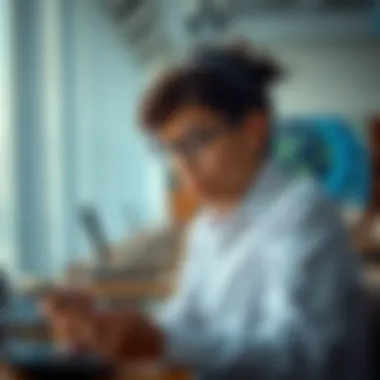Private Schools in Dubai: Insights and Trends


Intro
Dubai is a fascinating place, a melting pot of cultures, ambitions, and dreams. This cosmopolitan atmosphere extends to its education sector, particularly private schools, which cater to a diverse community. Parents often wrestle with the hefty task of finding the right fit for their children amid a multitude of choices. Not only does the landscape of private education in Dubai reflect its multicultural identity, but it also showcases the advancements in educational practices and technology.
In this exploration, we'll dive deep into the nuances that characterize private schooling in Dubai. From curriculum diversity that caters to international standards to a landscape shaped by global trends, parents face a labyrinth of options. It's not just about picking a school; it's about understanding the strategic moves behind these choices and what they mean for a child’s future.
If you’re an investor or expatriate navigating the intricate system, understanding these dynamics is crucial. The context of private schools may also reveal potential avenues for investment and insights into how the future of education is shaping up in this city.
Furthermore, this article promises to draw a detailed picture of what private schools offer. We will discuss key aspects such as academic frameworks, cultural diversity, accessibility, and the integration of technology into teaching. Each stitch of this educational tapestry is vital for providing parents with useful insights that can guide their decisions. Now, let’s first take a closer look at the market trends shaping private education in Dubai.
The Role of Private Schools in Dubai's Education System
Private schools play a crucial role in shaping the educational landscape of Dubai. They offer an alternative to the public education system, often providing diverse curricula and elevated academic standards. This segment will cover the importance of private schools within Dubai's education framework, highlighting their benefits and the considerations parents may need to take into account when selecting an educational path for their children.
Understanding the Educational Landscape
In Dubai, private schools cater to a large population of expatriates and locals, creating a rich tapestry of educational options. The educational system here is uniquely blended, reflecting the multicultural society. Families moving to Dubai often seek private schooling due to its alignment with international standards. Private schools often deliver a more tailored educational experience, allowing students to engage in various curricula that may resonate better with their backgrounds and future aspirations.
Many of these institutions prioritize specialized quality of education, offering small class sizes and innovative teaching methods. The educational landscape is characterized by competition among schools to attract students, leading to continuous improvement and adaptation of teaching strategies.
Moreover, private schools frequently bring in resources that are essential for holistic education—ranging from state-of-the-art facilities to advanced technology integration—all of which enhance the learning experience for students. Thus, understanding the landscape of private education means appreciating the different types of schools available, their missions, and what they offer students and families.
Private vs. Public Education
When comparing private education to public education in Dubai, several factors emerge that influence families’ decisions. Private education often stands out due to:
- Curriculum Variety: Private schools can offer different curricula, such as the British, American, or International Baccalaureate, catering to the preferences of expatriate families and locals seeking specific educational paths.
- Resource Allocation: With typically higher tuition fees, private schools can often afford better facilities, more extracurricular activities, and improved student-to-teacher ratios.
- Flexibility and Innovation: Private institutions usually have greater autonomy over their curriculum and operations, enabling them to respond quickly to educational trends and implement new technologies faster than public schools.
However, the public education system in Dubai is making strides as well, often providing quality education for Emirati citizens. The government invests heavily in developing and improving public schooling options, with a focus on national educational goals.
In essence, the choice between private and public education is often contingent on personal values, financial considerations, and long-term educational objectives for students. Parents need to weigh these options carefully within the context of their family's aspirations and societal norms.
"Private education in Dubai is seen as not just an alternative, but often a necessity for families seeking to maintain cultural identity while adapting to a fast-paced, modern society."
In summary, private schools in Dubai are not merely options within the educational framework; they are pivotal in providing specialized, diverse, and globally recognized educational standards, enriching the lives of students who navigate their ambitions in a vibrant, multicultural city.
Diversity of Curriculum in Private Schools
The landscape of private schools in Dubai is as varied as its vibrant culture. The diversity of curricula offered in these institutions plays a crucial role in not only meeting the needs of expatriate families but also in enhancing the overall educational experience for all students. This plethora of choices allows parents to select educational paths that align with their values, aspirations, and the future they envision for their children. The significance of this diversity is underscored by several factors you should consider:
- Global Standards: Different curricula align with various international education standards, ensuring students are prepared for global citizenship. The more options available, the easier it is for families to find a match for their specific educational needs.
- Cultural Relevance: Each curriculum often integrates aspects of its originating culture, allowing students to gain a richer worldview while still connecting with their own heritage.
- Flexibility for Growth: As families relocate, children encounter different educational systems, and having access to varied curricula means a smoother transition when moving between schools or countries.
In a city like Dubai, where the student population is tremendously diverse, the options available cater to many different aspirations, learning styles, and future aspirations of families.
International Baccalaureate Programs
The International Baccalaureate (IB) is a curriculum that has been making waves in Dubai’s educational scene. Known for its rigorous standards, the IB program is designed to foster critical thinking, research skills, and a comprehensive understanding across disciplines.
One of the most significant advantages of the IB program is its emphasis on holistic learning. Students are not just tested on rote memorization; they engage in a variety of projects, personal reflections, and community service activities. This method aims to cultivate well-rounded individuals prepared for challenges beyond academics.
Moreover, the IB’s global recognition can open doors to numerous universities worldwide.
Families considering the IB pathway often appreciate the emphasis on:
- Inquiry-based Learning: Encouraging students to ask questions and seek out answers rather than simply receiving information.
- Interdisciplinary Approach: Linking subjects together, helping students relate concepts from different fields.
British and American Curriculum Schools
In Dubai, British and American curriculum schools are among the most sought after, reflecting the city's strong ties to these educational traditions. Each offers a unique approach to education based on their national standards.
British Curriculum: This tends to be structured around two main examination stages, GCSE and A-Level. The British system is often praised for its focus on specialization at the A-Level, allowing students to hone in on their passions.
- **Pros:
- Structured Assessment:** Regular testing helps students track their progress.
- Comprehensive subject offering:** Students can choose from a wide range of subjects tailored to their interests.
American Curriculum: More flexibility characterizes the American approach, with a broader scope, often including Advanced Placement (AP) courses that provide college-level curricula. This curriculum allows students to explore various subjects before deciding their career pathway.
- Pros:
- Elective Diversity:** Students can dabble in many areas, from science to the arts.
- Focus on critical thinking:** Emphasizing skills necessary for today's problem-solving environments.
National Curriculum Options
While international curricula are prevalent, several private schools in Dubai offer the UAE National Curriculum, reflecting local educational mandates and cultural values. This curriculum aims to ensure that students not only thrive academically but also understand and connect with Emirati history and values.
- Focus on Arabic: The curriculum includes a strong emphasis on teaching Arabic language and culture, promoting integration and respect for local traditions.
- Balanced Education: Students are encouraged to take part in various subjects including sciences, humanities, and arts, ensuring they receive a well-rounded education.
Choosing a private school that follows the national curriculum may appeal to families who desire their children to gain a deeper understanding of their home country, balancing international exposure with local enrichment.


With such a vast array of educational frameworks, Dubai's private schools are well-positioned to prepare students for a competitive global stage while embracing local values and fostering international awareness.
Factors Influencing Parent Choices
In the bustling landscape of Dubai’s private education system, parents find themselves navigating through a myriad of choices. The decision of selecting a school for their children is not only pivotal but can also be daunting. With various factors at play, it's essential for parents to take a closer look at what truly influences their decisions. Here, we’ll delve into three core aspects: Academic Performance and Reputation, Location and Accessibility, and Cost Considerations—each playing a significant role in shaping the education journey of young learners.
Academic Performance and Reputation
When it comes to picking a private school, academic performance and reputation often top the list for most parents. Many families seek institutions that boast strong results in standardized testing and structured assessments. A school's reputation can significantly impact its allure; thus, schools with high-performing students often see a surge in applications. Parents conduct their research, checking ratings from various agencies like the Knowledge and Human Development Authority (KHDA), trying to guess where their child will thrive best.
But reputation isn’t merely about statistics; it's also about results over time. An institution that has consistently produced successful graduates or is renowned for different programs—such as the International Baccalaureate or Advanced Placement courses—will likely be more appealing. Parents are not just looking at what's on paper; they also want to hear firsthand experiences from other families.
“Choosing a school is a bit like dating. You have to feel a connection to the institution’s ethos and integrity.”
Another point worth noting is how many schools emphasize result-driven teaching methodologies, which focus on skills that translate into real-world applications. This can be a deciding factor, especially when parents weigh a school’s commitment to preparing their child not just academically, but also as a future professional in an increasingly competitive world.
Location and Accessibility
Distance and access can weigh heavily on a parent’s decision. Dubai is known for its traffic woes; therefore, the convenience of a school’s location cannot be overstated. Many parents prefer schools that are nearby to minimize commuting time. This can mean less time spent stuck in traffic and more time devoted to family, extracurricular activities, or even personal pursuits.
Accessibility also refers to the quality of commute routes. Families consider whether the route includes congested areas or whether safe transportation options are available. Moreover, schools that provide bus services can be particularly attractive to parents who prefer not to manage daily drop-offs and pick-ups themselves.
In addition, it’s essential to consider how a school fits into the broader community. Schools located in neighborhoods with supportive environments or robust facilities for family activities lend peace of mind to parents.
Cost Considerations
The financial aspect of private education can’t be shunted aside, either. Tuition fees vary wildly among schools in Dubai, and while many parents are willing to invest a hefty sum for quality education, not everyone can afford the top-tier schools. Families often find themselves weighing the cost of a school against its offerings. Is paying a premium worth it for facilities that the child might not even use?
Some schools offer scholarships or financial aid. This can open doors for families who wish to enroll their children in establishments that might otherwise be out of reach financially. Understanding fee structures, hidden costs, and the overall value of the education provided is vital.
In summary, for parents in Dubai, the journey throughthe private school selection process is not one to be taken lightly. Academic reputation, location and accessibility, coupled with cost considerations, play integrative roles. The combination of these factors ultimately helps to guide choices reflective of both family values and aspirations for their children.
Cultural Diversity in Schools
Cultural diversity in schools is not just a buzzword; it's a cornerstone of the educational landscape in Dubai. Given the city’s status as a melting pot, where cultures from all corners of the globe converge, private schools have woven this diversity into their very fabric. This section unpacks the dynamics of cultural plurality in schooling environments, including both the benefits and the challenges it presents.
The Impact of Expatriate Communities
Expatriate communities in Dubai shape the educational experiences available in private schools. With a staggering 80% of the population being non-nationals, the presence of various expatriate communities influences not only the student body but also the curricula delivered. Schools cater to these unique demands by adopting international curricula like the International Baccalaureate or British A Levels, which often reflect a broader global perspective.
The benefits of this cultural mix are extensive. Children from different backgrounds gain exposure to a variety of values and traditions, fostering an environment of empathy and understanding. Schools often celebrate multicultural events, such as national days and festivals, providing students with opportunities to share their customs. This exchange promotes not only a sense of belonging but also global citizenship.
On the downside, challenges can emerge. At times, differing beliefs and practices might lead to misunderstandings or conflict. It requires proactive measures from schools to cultivate a respectful dialogue among students and staff, all while ensuring that cultural sensitivity is prioritized in every educational interaction.
Integration of Local Culture
Integrating local Emirati culture into the educational framework is equally crucial for private schools in Dubai. While expatriates dominate, it’s important that local traditions, language, and values are not lost in the shuffle. Schools play a pivotal role in fostering respect for Emirati heritage while providing an inclusive environment.
Language programs that offer Arabic instruction help bridge the cultural gap and enhance communication skills, empowering students to engage fully with the local community. Moreover, teaching local history and traditions as part of the curriculum is not merely educational; it's vital for promoting respect and understanding among students of various backgrounds.
A genuine integration of local culture can yield several advantages. For expatriate students, it fosters an appreciation of the rich history and customs of the UAE, enhancing their ability to navigate the local landscape more effectively. For local students, it provides an opportunity to learn from their peers, enriching their social experience.
In essence, a school environment that successfully blends local culture with the diverse practices of expatriate communities creates a vibrant, dynamic atmosphere—offering students a well-rounded education that prepares them for the globalized world.
"Cultural diversity is the one thing we all have in common. It is the thing that we must cherish and honor."
By embracing both local and international cultures, private schools in Dubai stand as microcosms of the broader society, equipping students with the skills and understanding needed to thrive in an increasingly interconnected world.
In summary, the cultural diversity present in Dubai's private schools not only enhances the educational experience but also prepares students to engage meaningfully within the global community, all while respecting the rich traditions of the UAE.
Extracurricular Activities Offered
Extracurricular activities in private schools play a crucial role in shaping a holistic educational experience. These programs not only complement academic learning but also foster personal growth and life skills among students. Engagement in such activities allows children to explore their interests, develop their talents, and build relationships with peers outside the classroom setting. In Dubai, the vibrant multicultural environment adds a unique twist to these offerings, making involvement in extracurricular activities particularly beneficial.
Sports Programs
Sports programs in private schools throughout Dubai are often robust and varied. Schools typically offer a range of sports from football and basketball to swimming and athletics. Participation in these sports does not just promote physical fitness but also teaches essential life skills such as teamwork, discipline, and perseverance.
Moreover, schools often organize inter-school competitions, allowing students to showcase their talents on a larger platform. This competitive spirit helps nurture a sense of camaraderie and school pride among students. Parents appreciate the schools that encourage sports participation, as it often leads to better overall health and well-being for their children. Given the importance placed on health and fitness in the UAE, these programs are not just extras; they are a fundamental aspect of the school experience.
Arts and Music Education
Arts education, including both visual arts and music, is another vital component of extracurricular activities. In Dubai's diverse cultural landscape, schools harness this rich tapestry by offering classes in various artistic mediums, enabling students to express their creativity.
Through music programs, students have the chance to learn various instruments, participate in bands or orchestras, and even engage in musical theater. This participation can significantly enhance self-esteem and confidence. Similarly, art classes, ranging from painting to sculpture, allow students to explore their imaginations and hone their skills. Schools often hold exhibitions that provide students an opportunity to present their work, which can be a proud moment for them and their families. Art and music education stimulate cognitive development and improve focus, making these subjects integral to a well-rounded education.
Community Service Opportunities
Community service is increasingly recognized as an important element of educational programs in Dubai's private schools. Schools often require or encourage students to participate in community service projects. This involvement teaches students the value of giving back and fosters empathy towards those in need.
Activities may include volunteering at local shelters, organizing charity drives, or participating in environmental clean-up campaigns. These initiatives not only benefit the community but also build interpersonal skills and leadership qualities in students. Through these service projects, students learn to appreciate the diversity of the world around them, gaining firsthand experience that fosters respect and understanding.


"In Dubai, the blend of extracurricular activities with academic learning prepares students not only for exams but for life."
Collectively, these extracurricular activities solidify the importance of a well-rounded education. Parents seeking to enroll their children in private schools should consider the depth and breadth of these programs, as they add value and enrich the educational experience. Ultimately, the more opportunities schools provide for students to engage in various activities, the more equipped those students will be to navigate the complexities of the modern world.
Technology in Education
The integration of technology in education is a pillar supporting the evolution of private schools in Dubai. This city knows how to embrace advancements, creating a landscape where digital solutions are increasingly pivotal. For parents and educators, the importance of technology transcends the mere addition of gadgets in classrooms. It reshapes how knowledge is imparted and absorbed, preparing students for an ever-evolving world.
Digital Learning Tools
Digital learning tools are no longer a novelty; they are crucial in fostering a dynamic educational environment. Schools in Dubai are leveraging these tools not just for convenience, but to enhance learning outcomes.
- Interactive Learning Platforms: Programs like Google Classroom or Microsoft Teams are vital in promoting collaboration among students and teachers. They allow real-time feedback and innovative ways of interacting with course materials.
- Gamification: By embedding game-like elements into the learning process, schools elevate student engagement. Applications such as Kahoot or Quizlet make learning feel less like a chore and more like an exciting challenge.
- Personalized Learning: Tools that adapt to the individual learning pace of students have gained traction. Platforms like Khan Academy and IXL offer a tailored approach that addresses the unique strengths and weaknesses of each learner.
These tools ensure learning is not only relevant but also engaging, appealing to the tech-savvy nature of today’s youth.
The Role of Online Learning Platforms
Online learning platforms have become instrumental in offering flexible and accessible education options. Particularly beneficial in a cosmopolitan city like Dubai, these platforms break geographical barriers, giving students access to quality education anywhere.
- Increased Accessibility: Not everyone can hop into a strange caliber of schools. Online platforms allow families from numerous backgrounds to access courses that might not be physically available to them. Whether it's an international baccalaureate program or specialized subjects, students can find something that fits.
- Resource Availability: Platforms such as Coursera and edX provide free courses from major universities worldwide. This opens doors for students to engage with additional materials that complement their curriculum, promoting a broader understanding of subject matter.
- Skill Development: Beyond ordinary curriculum, many platforms focus on skills that employers look for, such as coding, digital marketing, and cybersecurity. This prepares students for a future job market where adaptability and diverse skill sets are invaluable.
"Technology has the potential to empower academic growth while catalyzing essential skills for the future."
In summary, the role of technology in Dubai's private education sector is substantial. As schools harness digital learning tools and online platforms, they engender a more inclusive, engaging, and effective educational experience that aligns with global standards and local needs.
Understanding School Rankings
When it comes to choosing a private school in Dubai, the discussion often surrounds the notion of rankings. Understanding school rankings is crucial since they can serve as a semblance of quality assurance. Parents, expatriates, and even investors look at these ratings to gauge a school’s reputation and academic performance. In a city known for its dynamic educational scene, the importance of effective ranking evaluations cannot be overstated. They provide insights into various aspects that could potentially impact children’s futures.
The ranking process is more than just a numbers game, it acts as a tool that can break down factors like academic excellence, student-teacher ratios, and extracurricular offerings. By familiarizing themselves with these elements, parents can make informed decisions based on what aligns with their children’s needs, values, and future aspirations. An informed choice could well mean the difference between a mediocre experience and an enriching one.
Criteria for Evaluating Schools
When rankings come under scrutiny, several specific criteria stand out. Schools are generally evaluated based on:
- Academic Performance: This often includes standardized test scores, college admission rates, and overall grade averages. A school that consistently produces high-achieving students may likely have effective teaching methods and resources.
- Curriculum Diversity: The range of subjects offered, including the integration of various international and local curriculums, can influence a school’s ranking. More options often translate to a richer educational experience.
- Facilities and Resources: Access to laboratories, libraries, and technology can also play a pivotal role in how schools are ranked. A school that offers state-of-the-art facilities might gain a competitive edge.
- Teacher Qualifications: The experience and qualifications of the teaching staff significantly affect the learning atmosphere. Schools that employ highly qualified educators are often rated more favorably.
- Parental Involvement: High levels of engagement from parents and strong community relationships may enhance a school’s reputation in rankings. It often correlates with better student outcomes.
These criteria provide a more comprehensive understanding of how various elements contribute to a school’s overall performance and reputation. Many parents look beyond simplistic rankings to understand what makes a school tick.
Popular Ranking Agencies
Several agencies and organizations take on the responsibility of evaluating schools, and as such, their methodologies can vary widely. Here are notable ranking agencies that focus on schools in Dubai:
- Council of International Schools (CIS): This organization provides only accredited schools a place in their assessments based on a variety of educational standards and practices.
- Dubai Education Council: They often release reports that include evaluations based partially on student outcomes and the overall educational environment within the Emirate.
- British Schools Overseas (BSO): This agency assesses British curriculum schools and provides detailed reports on compliance with UK standards.
- International School Consultancy: This global consultancy ranks schools based on a wide array of parameters, including student demographics, curriculum types, and success metrics.
Understanding who ranks schools and how they do it can significantly affect how parents perceive these institutions. By recognizing the credibility and methodology behind each ranking agency, families will be better equipped to make thoughtful decisions regarding their children’s education.
“Choosing the right school is like picking the right path in a labyrinth; every twist and turn could lead to a different future.”
The landscape of private schools in Dubai is indeed nuanced, and rankings, while informative, are just one piece of the educational puzzle.
The Admission Process
Navigating the admission process of private schools in Dubai can be as complex as solving a Rubik's Cube on a roller coaster. It is a vital part of understanding how to secure a spot in these often sought-after institutions. As expatriate communities continue to swell, the competition for spots becomes fierce, making it essential for families to grasp the intricacies involved.
Necessary Documentation
When it comes to admission, documentation is king. Parents must prepare a lineup of crucial paperwork that typically includes:
- Birth Certificate: An original and a copy often suffice. This document establishes the child's identity and age, which the school will verify against their admission criteria.
- Previous School Records: If transferring from another school, you'll need transcripts or report cards. This gives schools a glimpse into the child’s academic journey and behavior.
- Passport Copies: Copies of the child's and parents' passports are usually required, ensuring that the school's records are in order.
- Medical Records: These include vaccination reports or health certificates, confirming that the child is fit to join school.
- Proof of Residency: This might be a utility bill or rental agreement. It demonstrates that the family resides within a certain zone or provides context for out-of-zone applications.
Gathering these documents can feel like collecting Pokémon cards—every piece has its importance. Without any key cards, or in this case, documents, the enrollment process might just not get off the ground.
Interviews and Assessments
Once the paperwork is in order, the next stage often includes interviews or assessments. These can vary from school to school, yet they usually serve a few vital functions.
At this point, the school aims to get to know the child better. Some schools may have a casual meet-and-greet format, whereas others might conduct more formal interviews with both the child and the parents. The intention is to gauge a child's readiness and fit within the school environment.
- Academic Assessments: Based on the grade level, a standard academic assessment could be given to ensure the child meets specific criteria. It’s like a mini entrance exam, testing the waters of what the child knows.
- Social Skills Evaluation: These can be trickier to quantify, but educators often watch how a child interacts with peers. Schools look into whether the child can adapt well socially, as they are not just admitting students but also creating a community.
The assessment stage can feel daunting, but it serves to ensure that both the child and the school align in values and expectations, helping to pave the way for a smoother integration.
Scholarships and Financial Aid
The subject of scholarships and financial aid in Dubai's private schools holds a vital position in the broader context of education accessibility. For many families, the rising cost of private education can feel like a mountain to climb. However, scholarships can offer a lifeline, making high-quality education attainable for students from diverse financial backgrounds. The significance of these financial incentives cannot be overstated: they enable a more well-rounded educational experience across various demographics, ultimately benefiting the society as a whole.
Importance of Financial Support
Scholarships achieve more than just easing financial burdens. They allow schools to attract talented students regardless of their economic situation. When meritorious students are given chances, a richer pool of perspectives and skills emerges within classrooms. It's like opening a window in a stale room; fresh ideas flood in. For schools, this variety enhances the overall learning environment, fostering a culture of excellence that motivates everyone involved.


Factors to Consider
When delving into the world of scholarships and financial aid, families should consider several key elements:
- Application Process: Understand how to navigate the complexities of scholarship applications. The process usually includes forms, essays, and letters of recommendation. Knowing this upfront can ease anxiety.
- Renewability: Some scholarships are one-time awards, while others are renewable. Find out what keeps a scholarship active to avoid surprises in future years.
- Conditions: Certain scholarships may require students to maintain a specific academic performance or participation in extracurricular activities. Make sure to review these aspects carefully to prevent potential pitfalls.
Types of Scholarships Available
In the bustling educational landscape of Dubai, various scholarships are available to families seeking to provide their children with a quality education. These can generally be classified into the following categories:
- Merit-Based Scholarships: Awarded to students based on academic achievements or exceptional talents in areas like sports, arts, or music. These scholarships often showcase high performers who inspire others to reach for excellence.
- Need-Based Scholarships: Designed specifically for families facing financial hardships. These scholarships focus on economic circumstances rather than academic performance. They ensure that financial difficulties do not hinder a child's education.
- Sibling Discounts: Some schools offer discounts for families with more than one child enrolled, making education more affordable for larger families.
- Specialized Programs: Certain private schools extend scholarships for students with unique skills or backgrounds, such as those with disabilities or from underrepresented groups, further pushing the envelope of inclusivity.
Eligibility Criteria
Understanding the eligibility criteria for various scholarships is crucial. Generally, schools stipulate conditions that applicants must meet:
- Academic Performance: Many merit-based scholarships require a minimum grade point average or standardized test scores. Schools are keen to ensure their scholarship recipients reflect their commitment to excellence.
- Financial Need: For need-based scholarships, families may need to provide documentation that demonstrates their financial situation, such as tax returns or pay stubs.
- Extracurricular Participation: Active involvement in community service or extracurricular activities can be a favorable factor for scholarship consideration.
- Recommendations Essays: Some scholarships may require letters of recommendation, showcasing both academic aptitude and character. A solid recommendation can be the cherry on top of a strong application.
In sum, scholarships and financial aid play a pivotal role in balancing the educational landscape in Dubai's private schools. By providing access to quality education, these financial offerings not only create opportunities for students but also enrich the communities in which these schools operate. Every dollar invested in a child's education can yield significant returns, paving the way for a more educated workforce and a brighter future.
Collaboration with Parents
The relationship between private schools and parents plays a pivotal role in shaping an effective educational experience for students in Dubai. Collaboration between these two entities is not merely a formality; it's a crucial partnership that often dictates the quality of education a child receives. When parents are actively engaged, schools have the opportunity to tailor their programs and services to meet the diverse needs of families, ultimately enhancing the educational outcomes for students.
Parent-Teacher Associations
Parent-Teacher Associations (PTAs) serve as an essential bridge between the school and home. These associations create a structured format for parents to actively participate in their children's schooling. In Dubai, where cultural diversity is the norm, PTAs also promote inclusivity and representation, allowing voices from various backgrounds to contribute to school initiatives.
Benefits of PTAs include:
- Enhanced Communication: Regular meetings and updates foster transparency and keep parents informed about school policies and their child’s progress.
- Input on School Decisions: Through PTAs, parents can provide feedback on curricular content, extracurricular activities, and school events, which encourages a more tailored educational experience.
- Social Integration: These associations often host events that not only allow parents to interact with teachers but also to get to know each other, building community connections that enrich school culture.
Many schools in Dubai encourage parents to become involved, recognizing that parents who take interest in their children’s education can significantly contribute to their success. The engagement may even extend to volunteering in classrooms or helping organize school events.
Role of Feedback in Improvement
Feedback is the lifeblood of improvement in educational settings. In the context of private schools in Dubai, the role of feedback—both from parents and students—cannot be overstated. It allows educators to pinpoint areas of success and identify where changes may be necessary.
Schools benefit immensely from having open channels for feedback. This can be done through:
- Surveys: Regular surveys can gauge parent satisfaction and provide insight into the effectiveness of school programs.
- Suggestion Boxes: Offering avenues for anonymous feedback can encourage more honest communication.
- Parent-Teacher Meetings: Scheduled meetings create opportunities for direct dialogue between teachers and parents, ensuring that concerns are addressed promptly.
“An effective feedback mechanism not only helps schools improve but also empowers parents to be active participants in their child’s educational journey.”
In essence, the collaboration between parents and schools in Dubai fosters an environment of mutual growth. It emphasizes that successful education is a collective endeavor, requiring efforts from both educators and families. This partnership nurtures a holistic approach to a child’s development, aligning academic goals with cultural values and individual aspirations.
Future Trends in Private Education
In the rapidly changing world of education, private schools in Dubai are not just following trends; they are setting them. This section dives into what the future holds for these institutions, focusing on evolving teaching methodologies and the integration of AI in learning. Understanding these trends is crucial for investors, expatriates, and parents who seek to navigate Dubai's educational landscape effectively.
Evolving Teaching Methodologies
The traditional classroom setup is morphing into something quite different. Schools in Dubai are increasingly adopting student-centered approaches. This means that instead of teachers merely dispensing knowledge, students are becoming active participants in their education. Methods such as flipped classrooms, experiential learning, and project-based assessments are gaining traction.
A key benefit of these methodologies is their alignment with 21st-century skills. Critical thinking, creativity, and collaboration skills are now integral to the curriculum. For instance, some schools encourage students to engage in real-world problem solving, linking classwork with community issues. Through such experiences, students develop a deeper understanding of the material while also gaining practical skills.
Additionally, the focus is shifting from memorization to understanding concepts. Schools are experimenting with differentiated instruction, where teaching strategies are tailored to meet the varied needs of students. This customized approach not only enhances student engagement but also boosts academic performance. In a diverse city like Dubai, where students come from varied educational backgrounds, adaptability in teaching methodologies is paramount. By embracing these innovative teaching methods, private schools are preparing students to thrive in a complex and fast-paced world.
Integration of AI in Learning
Artificial Intelligence (AI) is becoming a significant force in education, reshaping how students engage with learning materials. In Dubai’s private schools, AI is not just a buzzword; it's revolutionizing classroom experiences. Implementing AI tools can provide personalized learning experiences tailored to each student's needs.
For example, platforms like Knewton or DreamBox use algorithms to analyze student performance data and adjust the difficulty level of assignments accordingly. This type of adaptive learning technology ensures that no learner is left behind, allowing quicker progress for students who grasp concepts rapidly, while still offering support for those who might need additional help.
Moreover, AI-driven tutors are supplementing traditional educational resources. These digital assistants can answer questions in real time, provide additional explanations, and even suggest resources for further study. They help reinforce classroom learning and ensure that students have access to support outside school hours.
"The integration of AI in learning has the potential to make education more inclusive and efficient, bridging gaps that previously hindered student success."
Despite its benefits, the integration of AI comes with considerations. There are concerns about data privacy and the ethical implications of using AI in educational settings. Schools must take these issues seriously and put safeguards in place to protect students. Thus, while the future looks promising, ongoing discussions about these challenges are crucial as educational institutions embrace technology.
In summary, the future trends in private education in Dubai signal a shift towards more engaging and personalized learning environments. Evolving teaching methodologies and the integration of AI are playing vital roles in shaping these trends, presenting both opportunities and considerations for educators, parents, and investors alike.
Epilogue
The discussion around private schools in Dubai cannot be overstated, as it reflects the broader context of education, aspirations, and cultural dynamics in a rapidly evolving city. Educators, policymakers, and families strive to navigate a landscape that is not just about learning but also about understanding diverse perspectives. Private schools play a pivotal role in shaping the educational objectives and career paths of children. They offer tailored curricula that cater to global standards while preserving local traditions, providing a balanced schooling option that many families seek.
Summary of Key Points
In bringing together various elements explored throughout this article, the following points emerge as crucial:
- Diversity of Curriculum: The landscape includes the International Baccalaureate, British, American, and other national curricula, reflecting a rich tapestry of educational philosophies.
- Cultural Integration: Schools actively promote the integration of expatriate communities alongside local cultures, which enriches students' experiences and worldviews.
- Extracurricular Offerings: The emphasis on holistic development through sports, arts, and community service enhances student engagement beyond academics.
- Technological Integration: Growing reliance on digital tools and online platforms speaks to changing educational methodologies, shaping the future of learning in Dubai.
- Parent Participation: Strong collaboration between parents and schools fosters an environment of continuous feedback, leading to improvements and adaptations in teaching methods.
Final Thoughts
Looking ahead, the world of private education in Dubai will likely continue evolving as it responds to global trends and local needs. Families are not just seeking a school; they are on a quest to find an environment that fosters growth, creativity, and adaptability in their children. This quest for quality education encapsulates not just academic success but also social and emotional wellness.
Moreover, as new technologies emerge and educational methodologies evolve, parents and educators must remain vigilant and flexible. The choices made today will impact the leaders of tomorrow, underscoring the importance of engaged dialogue and persistent improvement in educational offerings.
The emphasis on personalized education in private schools serves to highlight each child's potential, showcasing the vibrancy of Dubai’s educational landscape. The journey of exploring private schools in this city is not just about securing a place in a highly rated institution; it’s about nurturing the future generation in an interconnected world.



